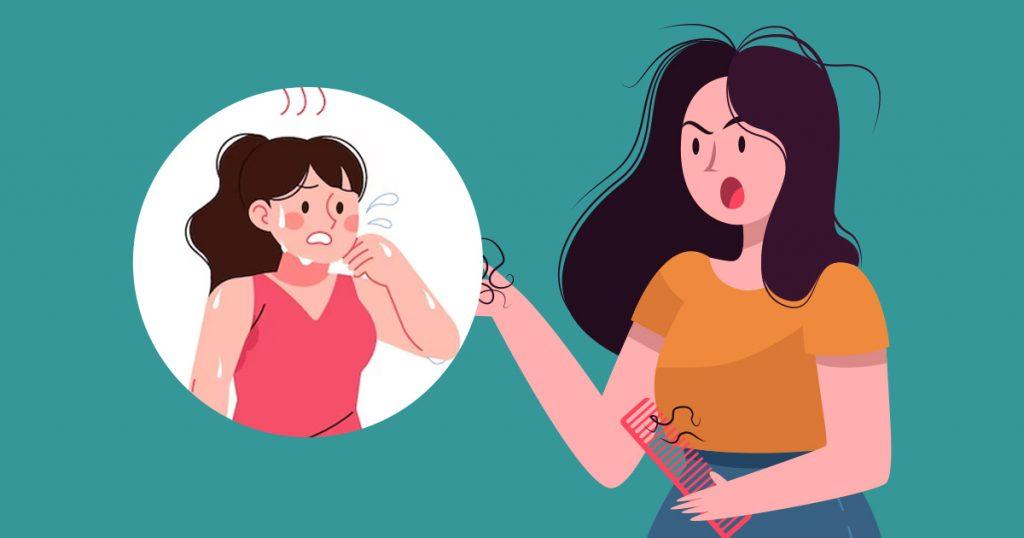Sweating helps keep our bodies cool and gets rid of toxins. But when sweat mixes with oils and bacteria on our scalp, it can cause problems for our hair. Some people worry that sweating too much could make them lose hair or damage it. Find out if sweat causes hair loss and learn some tips to keep your hair healthy, even if you sweat a lot.
Can sweat cause hair loss?
Sweat is bad for your hair, but it doesn’t directly cause hair loss. However, excessive sweating can create conditions that may contribute to hair loss. For example, when sweat mixes with bacteria and oils on the scalp, it can create an environment favorable for fungal infections and dandruff. If not treated, such conditions can weaken hair follicles and cause hair loss.
Also, sweat contains a high salt concentration, which can dry out the hair and scalp. This can make hair more prone to breakage and damage, especially if not washed regularly. Sweat can also make hair greasy and flat, which may contribute to reduced volume and thickness.
Another thing, sweating in a hat doesn’t directly cause hair loss. However, wearing a tight hat for a long time can make your scalp warm and sweaty, which might lead to issues like dandruff or fungal infections. These can weaken your hair and, if not taken care of, could cause hair loss. It’s best to wear hats that let your scalp breathe and keep your hair and hat clean.
Factors that Contribute to Excessive Sweat & Hair Loss
Numerous factors can contribute to excessive sweating and hair loss, including:
- Genetics: Some people are genetically predisposed to sweat more or experience hair loss.
- Hormonal Changes: Hormonal imbalances, such as those during puberty, pregnancy, or menopause, can lead to increased sweating and hair loss.
- Medical Conditions: Hyperhidrosis (excessive sweating), thyroid abnormalities, and autoimmune diseases can all result in excessive perspiration and hair loss.
- Medications: Certain medications may cause excessive perspiration and hair loss.
- Stress: It can cause excessive sweating and lead to hair loss.
- Poor Nutrition: A lack of vital nutrients in the diet can cause hair loss and other health problems, sometimes increasing perspiration.
- Environmental Factors: High temperatures, humidity, and wearing tight hats or headgear can increase sweating and potentially contribute to hair loss.
- Hair Care Practices: Certain hair care practices, such as the frequent use of harsh chemicals or heat styling tools, can damage the hair and contribute to hair loss.
It’s essential to consult with a healthcare professional to determine the underlying cause of excessive sweating and hair loss and to receive appropriate treatment.
Symptoms When Sweat Leads to Hair Loss
The following signs of sweating-related hair loss may be present:
- Thinning Hair: You may notice that your hair is thinning, especially in areas where you sweat more, such as the scalp or forehead.
- Increased Shedding: You may experience an increase in hair shedding, particularly during or after sweating.
- Itchy Scalp: Excessive sweating can lead to an itchy scalp, which may contribute to hair loss if scratched excessively.
- Dandruff: Sweating can exacerbate dandruff, which, if left untreated, can weaken the hair follicles and lead to hair loss.
- Scalp Irritation: Sweat can irritate the scalp, leading to inflammation, redness, or tenderness, which may contribute to hair loss.
- Changes in Hair Texture: Excessive sweating can make your hair seem greasy or fragile.
If you have any of these symptoms, you should speak with a healthcare expert or dermatologist to diagnose the underlying reason and obtain proper treatment.
Is hair loss from sweating reversible?
Especially if it’s due to transient conditions like dandruff or fungal infections, hair loss from excessive sweating is frequently reversible. Treating the root cause and maintaining good scalp hygiene can usually restore hair growth.
However, if hair loss is due to more severe conditions like traction alopecia (hair loss from pulling on the hair), the damage may be permanent. It is critical to consult with a dermatologist or healthcare professional to obtain an accurate diagnosis and appropriate therapy.
How do you prevent hair loss due to sweating?
To prevent hair loss due to sweating, consider these tips:
- Regular hair washing: Washing your hair regularly can remove sweat, bacteria, and oils that contribute to hair loss.
- Use a gentle shampoo: Sulfate-free shampoo to avoid stripping the hair and scalp of natural oils.
- Avoid tight hairstyles: Tight hairstyles, such as ponytails or braids, can stress the hair follicles and cause hair loss. Go for looser styles.
- Keep the scalp clean and dry: After sweating, cleanse your scalp with a gentle cleanser and dry it thoroughly to prevent fungal infections and dandruff.
- Protect hair from sweat: If you sweat a lot, consider wearing a sweatband or cap to absorb the sweat and protect your hair from damage.
Sweat and Hair Loss: Understanding the Connection
While sweat itself doesn’t directly cause hair loss, it can contribute to conditions that may lead to hair loss if not managed properly. Maintaining good scalp hygiene, washing your hair regularly, and protecting your hair from sweat can help prevent hair loss and maintain healthy hair. If you are suffering extreme hair loss, speak with a healthcare expert to get an accurate diagnosis and treatment.
